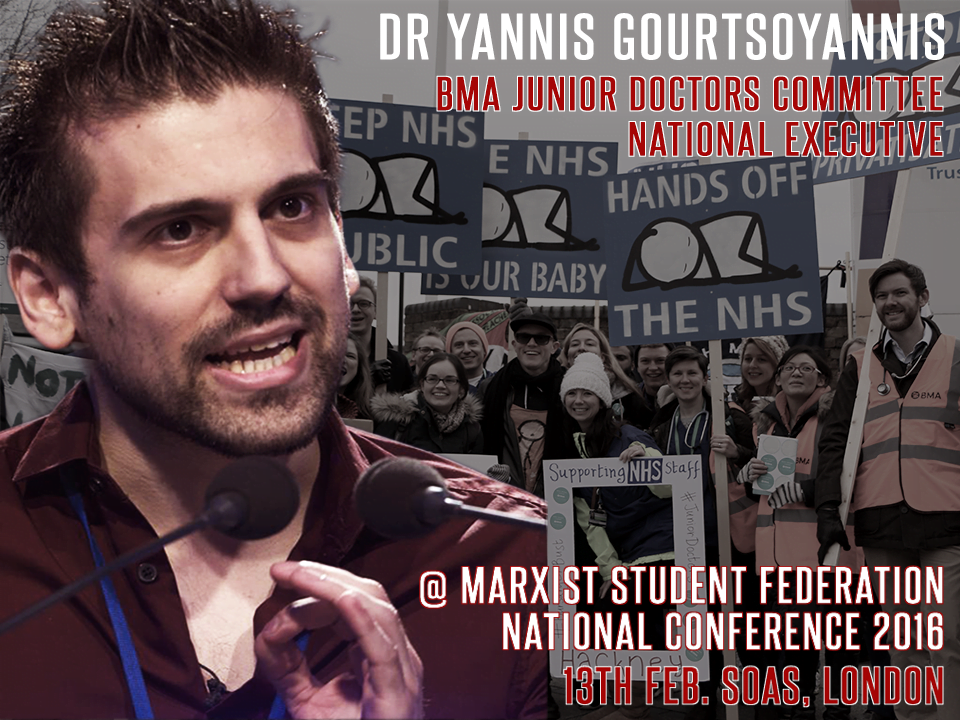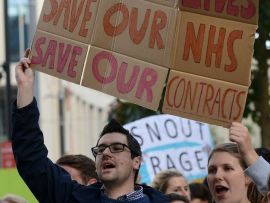Over the next week, junior doctors will demonstrate and strike in defence of their conditions and the wider NHS. We publish here a letter by a junior doctor, who highlights the importance of continuing the fight against the Tories. If you fight, you will win – militancy pays!
Tomorrow will see thousands of junior doctors – supported by other NHS staff and the wider public – take to streets of central London to protest against Tory attacks on their terms and conditions, and to defend the NHS against cuts and privatisations.
The demonstration tomorrow – the third mass protest by the junior doctors over the past few months – follows on from the successful and widely-supported day of strike action last month, and is preparing the ground for the next walkout by the medics on Wednesday 10th February, which is going ahead following a refusal by Jeremy Hunt and the Tory government to meet the junior doctors’ demands.
We publish here a letter by Dr Yannis Gourtsoyannis, a member of the BMA Junior Doctors’ Committee National Executive, who highlights the importance of continuing the fight against the Tories and in defence of the NHS. Placing this struggle in the wider context and history of the labour movement, Yannis draws one clear conclusion: if you fight, you will win. Militancy pays!
Socialist Appeal supporters will be out in London tomorrow and on the picket lines outside hospitals on Wednesday to offer solidarity to the junior doctors and join the fight to save the NHS.
Come to hear Dr Yannis Gourtsoyannis speak (in a personal capacity) at the Marxist Student Federation national conference in SOAS university, London, on Saturday 13th February.

Letter from a junior doctor: “We will win”
It had always been evident that we would never win this fight on the back of a single day of action. This battle will be a long one, and we will stay the course and prepare ourselves for periods of alternating negotiation and industrial action.
Trade union disputes throughout history have always entailed a lengthy struggle. That struggle can also often appear somewhat frustrating, with evolving conditions necessitating evolving plans. It will be exhausting and it will be indeed be frustrating; but it is important to bear in mind that this is the nature of industrial struggles.
We owe it to ourselves, to our future colleagues, to our patients and to our NHS to prepare ourselves for the long game and to prepare ourselves for a successful walkout on 10th February. The ’emergency care model’ as proposed is the right model for the present circumstances.
Around the world, the cosy ‘liberal’ freedoms enjoyed in many current democracies have been fought for and gained as a result of trade union action. Without trade unions and the willingness to deploy industrial action there would be no employment rights; we would have no weekends, sick leave, pensions or safety regulations; education would have been denied to the majority of the population; wages at the level of subsistence would be the norm; serious injury at work and child labour would be perceived as acceptable.
Furthermore, crucial battles for gender rights and equal pay legislation have been won as a result of trade union action; whether in the USA at the turn of the 20th Century, Dagenham in the 1960’s, or Bangladesh right now. The fight against racial discrimination too has also been mediated through trade unions; few people are aware that the night before his assassination in 1968, Martin Luther King had addressed striking sanitation workers in Memphis, as he was heavily involved in the political campaign to support these workers during the last few months of his life.
Our current action is of equal importance to the above struggles; it is ultimately about whether or not a functioning, universal health system remains in existence in this country.
Trade unions, at their best, are the supreme example of genuine democracy in action. It is no accident that one of the first acts of all modern dictatorships is to snuff out independent trade unions.
The same demands that we are making – to be valued, to be heard and to be negotiated with in good faith – are the same demands for which trade unionists around the world find themselves imprisoned or worse. Authoritarian regimes the world over recognise and fear the power that a united workforce is capable of expressing.
Luckily, in this country, thanks to the struggles of our trade union forebears we have gained certain democractic right. So here in the UK the worst we junior doctors will face is a hostile media (and its ridiculously pitiful smear campaigns). We will ignore their smears. On the 12th of January we ran pickets and “Meet the Doctors” events at every major hospital in England. It was incredibly moving experience the overwhelming levels of support from the public. That experience has confounded the cynical claim, repeatedly made by politicians and the media, that we would lose public support were we to follow through on industrial action. On the contrary, our resolve has gained us public support.
We will win this when the battle for the NHS becomes a core part of the public discourse; when the person in the street who takes an average interest in the public affairs of this country recognises the nature of the often quite complex events unfolding. That is true politics – not the hollow politics as defined by those in power.
We will maintain our struggle as a question of vital and urgent importance, by following through with an orderly and well-organised industrial action on 10th February, and by demonstrating in our thousands on the streets of London tomorrow.






